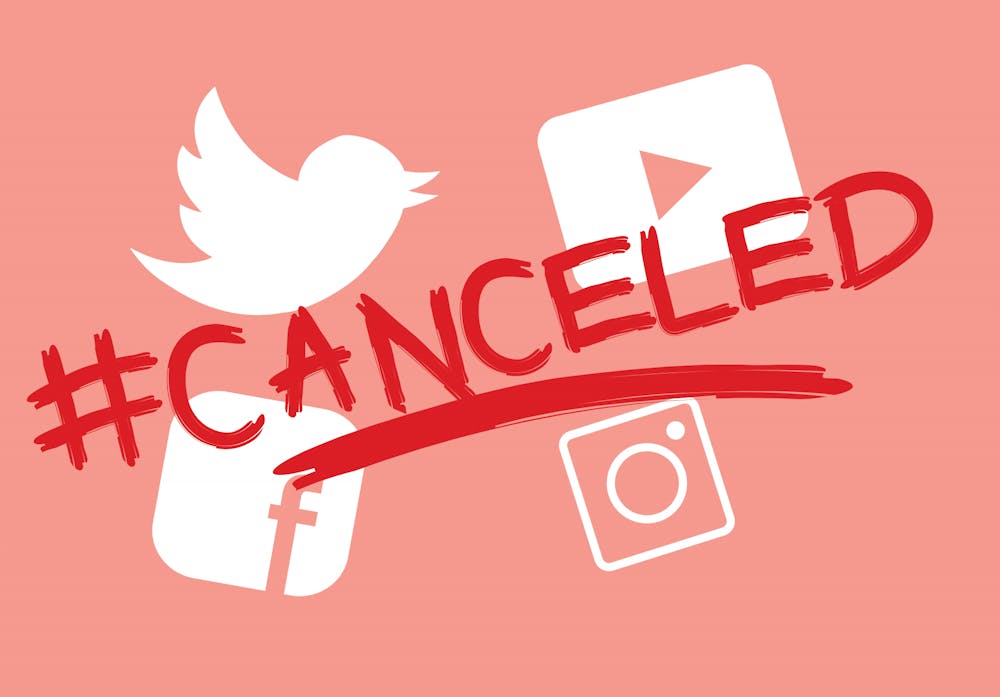Technology has continued to entrench itself in our everyday lives as it continues to provide easy communication and quick online transactions and give people nearly full access to the world in a single swipe. The growing importance of online interactions has melded into the physical world more than ever as people are forced to move to contactless deliveries and online classes due to the widespread COVID-19 pandemic.
As the social lives of students on platforms such as Twitter, Facebook or Instagram has become the majority of entertainment and interaction between friends and peers, the consequences from what is said in the online world has begun to grow, often materializing in the offline world. Specifically, consequences are resulting from cancel culture — the act of media users publicly shaming and socially cancelling other’s views on social media that don’t fit the audience’s criteria of what is socially acceptable. No longer can students expect to be safe from the repercussions of their words online as some universities have threatened student suspension, expulsion and scholarship revocations in response.
Media studies professor Bruce Williams expressed concerns of an educational institution invoking its authority on a student for expressing their personal thoughts on a digital platform.
“I have encountered these stories about someone who has been admitted to a university and then something they posted earlier online catches them up and then the university says we are rescinding admissions,” Williams said. “I have a hard time with that because … universities are about educating, about changing.”
According to Williams, the more institutional authority becomes involved in the surveillance of a student’s life online, the more that pernicious effects can arise as a result. These effects convince students that they are no longer able to change their minds and are pressured to constantly present a completely conventional version of themselves in fear of university retaliation. However, that is not to say that there shouldn’t be consequences for what a student may choose to post to the public.
“I think that what students are doing amongst themselves is … to socialize and discipline what's acceptable and not — I have a hard time getting very upset at that,” Williams said. “It's when institutions get involved … If we're going to have models of holding people, especially students, accountable, there have to be good models of how you apologize.”
Not only does cancel culture touch on the controversies between students in universities, but the actions of faculty members as well. For Ryan Russell, a doctoral candidate in the politics department, he believes that cancel culture allows for people to hold those in power to account that institutions otherwise would not.
“You have cancel culture where people are going to demand that this person not be in a position of influence because these systems that they operate in, they can use them and have utilized them in a dangerous way,” Russell said. “But I do think that there are certain limits … because sometimes I think that you will see a divide, depending on the issue.”
The steps to redemption from online social error become increasingly difficult to construct, where there can be a degree of debate or lack thereof in the variety of subjects that are susceptible to cancel culture. Where an action of one student could be forgiven by certain students, others may deem that an action is not simply one that can be forgivable or revocable.
Cancel culture focuses on cancellation as a consequence of how students portray their opinions and themselves on social media, but it’s difficult to know how one can un-cancel themselves — if there even is such an option. Third-year College student Kim Dinh discusses the complexities of attempting to return from one’s cancellation.
“[Redemption] is not just a one step thing, it's a multiple step process in terms of growth,” Dinh said. “It's not you changing overnight [but that] you consistently make that decision to not think a certain way or not or do certain things because you truly believe it, because your actual way of thinking has truly changed from that event.”
It is equally difficult to ascertain the correct measures to take in order to ensure that victims of actions that caused individuals to be canceled are able to get the justice they deserve. As social media increases its influence on people’s real lives, victims turn to social media masses to seek action where traditional university systems have failed to do so. Third-year College student Avery Shivers is concerned by the role victims of these incidents often have to play in educating the public over the wrongness of an action.
“It doesn't make sense for me to have a victim hold their perpetrator’s hand and teach them why what they said was offensive because I don't think that's justice,” Shivers said. “If you don't have a system that promotes and provides justice to victims, then those victims are going to take justice into their own hands.”
With universities having no clear guidelines in regards to handling a new source of information about their current and incoming students, there is much uncertainty surrounding the circumstances of not only online learning, but increasing online social interactions.
“There isn't a real clear distinction between online and in the real world.” Williams said. “When we spend as much time as we do every day staring at screens, that's part of our world. But it's also important to recognize that there still is a very real world.”







